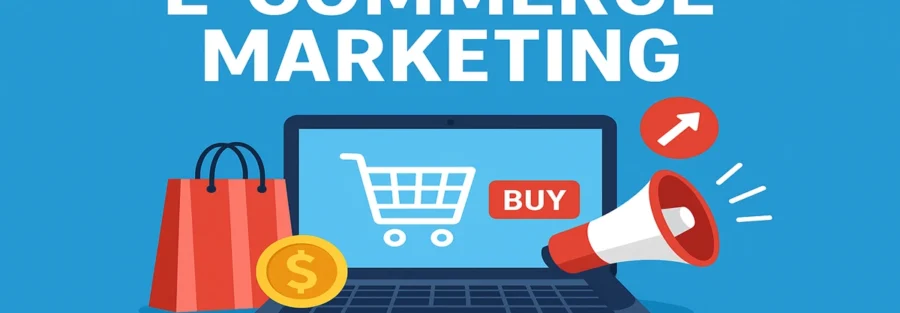Introduction
There has been a big change in our shopping habits in the last few years. Earlier, people used to go to the market and buy goods from shops, but now the world of mobile and internet has changed everything. Be it clothes, mobile phones, books or everyday items—now most people prefer to shop online. This is why E-commerce Marketing has become a necessity for every small and big business today.
E-commerce is not limited to just online shopping websites. It also includes social media platforms, email, Google search, and even mobile apps. By adopting the right strategy, any business can reach its customers easily. In this blog, we will understand in detail what E-commerce Marketing is, why it is important, its key features, real case studies, how to implement it, and finally, a simple conclusion and FAQ.
What is E-commerce Marketing?
If understood in simple language, E-commerce is the method through which any business delivers its products or services to customers through online platforms and motivates them to buy.
Just like earlier, a shopkeeper used to put posters outside his shop, advertise in a newspape,r or run ads onthe radio, in the same way today he shows his products in the internet. The only difference is that now all this happens through digital methods.
Understand in detail:
Whenever you see an advertisement on a website, mobile app or social media, it is a part of E-commerce. Its purpose is –
- To attract the customer – that is, to make them aware of your product.
- To give information to the customer – to tell about the price, features, offers, etc. of the product.
- To motivate to buy – to assure the customer so much that they buy the product from you.
Why does E-commerce Marketing Matter?
Today’s time is completely digital. People wake up in the morning and first pick up their mobile, check social media, search on Google ,and remain active on the internet throughout the day. When it comes to shopping, people now make decisions by first looking online, comparing, and reading reviews. In such a situation, if your business is not present online, then you lose a big opportunity to connect directly with your customers.
This is where E-commerce proves to be the most important. It is not just a marketing technique, but has become the basis of the success of your entire business.
1. Direct access to the customer
- Imagine if you have a shop that is open only in your city or area, then your customers will be limited. But E-commerce Marketing gives you the opportunity to reach customers sitting in any part of the country and the world.
2. Staying in competition
- Today, every big and small brand is present online. Giants like Amazon, Flipkart,and Myntra are already ruling the market. If you do not use E-commerce Marketing, the customer will go to your competitor.
3. More profit at less cost
- Traditional advertisements like TV ads, radio, or newspapers are very expensive, and it is not easy to measure their impact. On the other hand, in E-commerce Marketing, you can reach more people at less cost and can also see its data.
4. Better understanding of the customer
- E-commerce marketing gives you the opportunity to understand what the customer really wants.
- Which product is selling the most?
- At what time are people shopping the most?
- Which city are the customers coming from?
Key features of E-commerce marketing
Whenever we think of a business, the first thing that comes to mind is – “How will it reach the customers?” In traditional business, the only means were shops, posters, or newspapers. But now the era is digital, and here are some features of E-commerce Marketing that make it very special and effective.
Let’s understand them in detail:
1. Multi-channel Approach
- The biggest feature of E-commerce Marketing is that it is not limited to only one platform.
- Earlier, the customer used to come only to the shops, but today he is present on the website, mobile app, social media, and even email.
2. Personalization & Targeting
- Every customer has different needs. Some are college students who want budget-friendly things, while some are professionals who like premium products.
- With the help of E-commerce Marketing, you can show special offers and advertisements to customers based on their preferences and behavior.
3. Automation
- The most powerful feature of E-commerce Marketing is “automation”.
- Earlier, you had to send a message or email to every customer separately, but now you can do all this automatically with the help of tools.
4. Data-Driven Decision Making
- Data is the biggest power of the digital world.
- When you do E-commerce Marketing, you have data on everything—who saw the advertisement, who clicked, who bought the product, and who did not.
Case Studies: E-commerce Marketing success story
The real power of e-commerce is understood when we see how big brands have made their mark using the right strategies and reached millions of customers. Let us understand some such success stories in detail.
1: Amazon – The Power of Personalization
Amazon is not just a company today but a global brand, and the biggest reason behind its success is its e-commerce strategy.
What did Amazon do special?
They collected data on every click, every search, and every purchase of the customers.
What was the result?
Customers felt that Amazon understood their needs well.
2: Flipkart – The Magic of Big Sale Events
Flipkart changed the world of e-commerce in India. The biggest example of this is their famous event – Big Billion Days.
What did Flipkart do special?
They gave huge discounts and offers to attract customers during festivals.
What was the result?
Crores of products were sold during Big Billion Days.
How to use E-commerce Marketing?
Just knowing what E-commerce is and why it is important is not enough. The real challenge is to use it correctly. Many businesses come online, but they do not know where to start, which strategy to use or in which direction to move forward.
Let’s understand in simple language how to use E-commerce Marketing correctly:
1. Prepare a website and online store
- The first step is to create a reliable and attractive online store.
- Your website should be user-friendly so that customers can easily find products.
- Mobile-friendly design is important because most people today shop from mobile.
2. Adopt SEO and content marketing
- SEO (Search Engine Optimization) means bringing your website to the top on search engines like Google.
- Do keyword research—for example, if you sell shoes, use keywords like “good shoes at a low price.”
- Write blogs that answer customer questions.
3. Use social media marketing properly
- Social media is the most powerful weapon in today’s time.
- Facebook and Instagram: Post attractive posts and reels.
- YouTube: Create product demos and review videos.
4. Adopt email marketing
- Email marketing is still very effective today.
- Send emails to customers about new products and offers.
- Send special discount codes to festivals.
Conclusion
In today’s time, if any business wants to move forward, it should not depend only on traditional methods. The market has changed now. Before coming to the shop, the customer searches on Google, sees reviews on social media and compares with online platforms. In such an environment, E-commerce has become a lifeline for every business.
It does not matter whether your business is small or big, whether you sell clothes, books, electronics or any local product—by adopting the right e-commerce strategy, you can reach customers not only in the country but all over the world.
FAQ
1. What is E-commerce marketing in simple words?
E-commerce means promoting and selling products or services online through websites, apps, social media, search engines, and emails. Its main goal is to reach more customers, create brand awareness, and increase sales.
2. Why is E-commerce important for small businesses?
It is important because it allows small businesses to compete with big brands by reaching a wider audience at a low cost. Even with a limited budget, small businesses can use SEO, social media, and email marketing to attract and retain customers
3. What are the main types of E-commerce Marketing?
The main types include:
- SEO (Search Engine Optimization)
- Content Marketing
- Social Media Marketing
- Email Marketing
- Paid Ads (Google, Facebook, Instagram)
- Influencer Marketing
4. How can E-commerce Marketing increase sales?
It increases sales by:
- Targeting the right audience with personalized offers.
- Using paid ads to reach more people quickly.
- Sending reminder emails to customers who left products in their cart.
- Building customer trust through reviews, content, and social engagement.
5. Is E-commerce Marketing expensive?
Not always. Many strategies, like SEO, blogging, and organic social media, are free or low-cost. Paid ads may require investment, but you can start with a small budget and scale as you get results.
Curious about smart transportation and digital growth? Head over to Digital Pracer’s blog and explore content that keeps you ahead of the curve!








